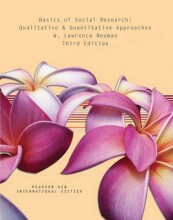Try our study magic for free
Summary: Knowledge Clips
- This + 400k other summaries
- A unique study and practice tool
- Never study anything twice again
- Get the grades you hope for
- 100% sure, 100% understanding
Remember faster, study better. Scientifically proven.
a PDF, study it super fast
- No sign up, email or credit card needed!
- AI makes unlimited flashcards
- Get unlimited quizzes and tests
- Ask AI anything
Create a notebook
- No sign up, email or credit card needed!
- Have and keep perfect overview
- Make flashcards, notes and mind maps
- Review, test and score!
Read the summary and the most important questions on Knowledge clips
-
1 Introduction to research methods
-
1.1 Social Research
This is a preview. There are 2 more flashcards available for chapter 1.1
Show more cards here -
Name 4 types of human experience.
- Sense perception
- Beliefs
- Emotions
- Thoughts
-
What are social sciences?
Sciences focussed on experiences related to humans. -
What are the four major distinctions in social science research?
- Approach
- Use
- Pupose
- Time dimension
-
Name the two different approaches of a study and their characteristics.
- Qualitative research
- Qualities
- Words and images
- Understanding meaning
- Quantitative research
- Quantities
- Numbers and statistics
- General tendencies
-
What are the two types of use of research and their characteristics?
Basic- Aimed at anything interesting.
- How does the world work?
- Researchers have freedom and intrinsic motivation.
- Success if results impact science community.
Applied- Aimed at practical problems.
- Can we solve this problem?
- Research as part of the job and at employer's demand.
- Success if results are 'usable'.
-
Name the three different purposes of research and their characteristics.
Exploratory- To explore
- What?
- Idea
generating - Feasibility studies
- To
descirbe - How? Who?
Categorizing and classifying
Explanatory- To explain
- Why?
- Theory testing
- Model comparison.
-
Name the three types of time dimensions in a research and their characteristics.
Case study- Focussed at an individual
- Can be measured a single time or more times
Cross-sectional- Focussed at a group of people
- Measurement takes place only one time
Longitudinal- Focussed at a group of people
- Measured more than one time
-
1.2 The Empirical Cycle
-
How is knowledge gained in empirical research?
Through direct and indirect observation or experience. -
Name the 7 steps in the reseach process of the empirical cycle.
- Select a topic
- Formulate a research question
- Designing the study
- Collecting the data
- Analyzing the data
- Interpreting the data
- Informing others
-
2 Theory and Ethics
-
2.1 Social Theories
This is a preview. There are 13 more flashcards available for chapter 2.1
Show more cards here -
What are the two states of behavior in social situations according to Milgram's agency theory?
The autonomous state and the agentic state.
Read the full summary
This summary +380.000 other summaries A unique study tool A rehearsal system for this summary Studycoaching with videos
- Higher grades + faster learning
- Never study anything twice
- 100% sure, 100% understanding
Topics related to Summary: Knowledge Clips
-
Theory and Ethics - Social Theories
-
Theory and Ethics - Ethics
-
Reviewing literature & planning a study - Planning a study
-
Reviewing literature & planning a study - Designing a study
-
Measurement - Conceptualization & Operationalization
-
Measurement - Reliability & Validity
-
Sampling - Populations & Samples
-
Sampling - Sampling Methods
-
Survey & Interview - Surveys
-
Survey & Interview - Interviews































